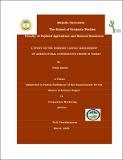| dc.description.abstract | In this modern and competitive business world the need of improved, capable and flexible
managerial skills to manage the working capital is very crucial. Cooperatives as business of the
poor section of the society with the core mission of improving the living standards of the owners,
they need strong support and control in improving their management. Hence, an attempt was
made in this research work to study the working capital management of the Cooperative Unions
in Tigray Regional State, Ethiopia. However, the result of the study shows that the overall
performances of Cooperative Unions are not satisfactory. The management of these Unions has
by far remained back when compared with other forms of competitive businesses in the market.
The Cooperative Unions’ position on liquidity, solvency, and efficiency in the resources
management and profitability shows fluctuating trends in the study period, 2004/5 – 2006/7. The
compositions and proportions of their current assets and current liabilities indicate that they are
not well managed in a way to earn profits. The percentage changes on the income statement and
balance sheet items have also showed fluctuating trends, in the years stated. This is also used as a
device to test the weakness or strength of the management in controlling the working capital level
of their Unions. Of course there are many factors which could be mentioned for the weaknesses
registered.
According to the assessment made the main factors for the less profitability of these Unions are
related with their internal managerial weaknesses and external influences. Some of the problems
mentioned are: lack of skilled personnel including the board members; lack of adequate and
timely market information, stiff competition in the market, lack of coordination
vii
among Unions; lack of cost minimization and working capital management, and the government
interference.
On the basis of these results, therefore, stakeholders’ of Cooperative Unions are recommended to
take corrective measures on employing trained and skilled personnel. Moreover, the board
members should be trained and even elected based on experiences and some educational
backgrounds. Structural improvements which enable Unions to decide in a fast manner with
flexibility are also recommended. Cooperative Unions should be audited and reports should be
prepared yearly. There should also be a mechanism of providing accurate and reliable
information independently.
There should be clear guidelines and other working manuals about their credit policies.
Moreover, standards of evaluation should be set so that Unions based on the same industry can be
evaluated and judged so as to identify their weaknesses and strengths. | en_GB |


